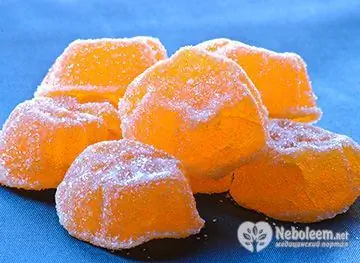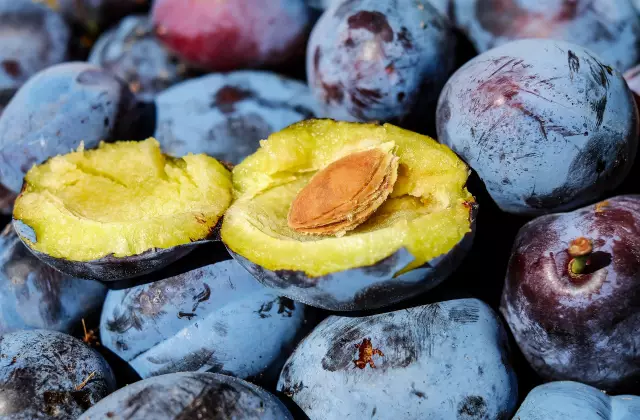- Author Rachel Wainwright wainwright@abchealthonline.com.
- Public 2023-12-15 07:39.
- Last modified 2025-11-02 20:14.
Calorie content of marmalade

Fruit jelly is a product of a thick jelly-like consistency, made from the pulp and juice of fruits by thickening them in the process of water evaporation. Traditionally, apples are used as raw materials for making marmalade, but in England marmalade is most often made from oranges, and in Spain from quince. The calorie content in jujube varies depending on the ingredients and raw materials. The high content of pectins and other gelling substances in these fruits makes it possible to make marmalade without artificial additives, and if the fruits are sweet, then without added sugar.
How many calories in marmalade
The production technology of modern marmalade, in addition to prescription components, allows the use of various additives that allow the production of cheaper and more affordable types of marmalade. How many calories are in the marmalade depends on the presence of the type of additives in the final product and the method of its manufacture.
Pectin, which is contained in many fruits, is used as a gelling component in the modern production of marmalade, agar-agar - an extract from seaweed and gelatin - a substance extracted from fat-free cartilage, bones and animal veins. The average calorie content of marmalade per 100 g of the finished product is 320 kcal, it contains 0.1 g of proteins, 0.1 g of fat, 79.3 g of carbohydrates.
Depending on the gelling substance used for the production of the dessert, marmalade is produced:
- Fruit and berry;
- Jelly;
- Jelly-fruit;
- Chewing.
Fruit and berry marmalade: calories
Pectin is used as a thickener for fruit and berry marmalade, which is produced from the peels of citrus fruits, apples, quince, watermelons, sugar beets and sunflower baskets. The calorie content of pectin-based marmalade in 100 g is 293 kcal, the product also contains 0.4 g of proteins, 0.0 g of fat, 76.6 g of carbohydrates.
Despite the relatively large amount of calories, pectin-based marmalade is very useful because pectin has the following properties:
- Reduces blood cholesterol levels;
- Promotes the elimination of radionuclides, anabolic steroids, xenobiotics, metabolic products;
- Participates in the normalization of lipid and carbohydrate metabolism;
- It is used in the treatment of atherosclerosis and dysbiosis;
- Normalizes the work of the pancreas, liver;
- It is used as a natural sorbent, which is more effective than activated carbon;
- Promotes tissue recovery in case of wound, burn injuries.
Jelly marmalade: calories
Jelly marmalade is more delicate in consistency, while dry agar-agar (seaweed) powder is often used as a thickener, in addition to pectin. The composition of jelly marmalade also includes sugar, molasses, fruit essence, food colors, citric acid, flavorings. Agar-agar-based jelly marmalade has a brighter color and a beautiful break.
The calorie content of jelly marmalade depends on the composition and can be from 280 to 350 kcal, jelly marmalade is called a carbohydrate dessert, since the content of proteins and fats in it is zero, and carbohydrates in such marmalade can be from 75.0 to 80.0 g.
Agar from seaweed is calorie-free; swelling in the stomach, fiber improves peristalsis, normalizes the gastrointestinal tract, and facilitates the liver. The main beneficial qualities of agar agar:
- It is a source of iodine, which the body needs for the normal functioning of the thyroid gland;
- The high content of vitamins B5, E, K and iron, calcium, magnesium, copper provides the body with these essential elements;
- Promotes the elimination of toxins.
Often, in the manufacture of marmalade, agar-agar can be replaced with gelatin - this is a thickener of animal origin, which is extracted from the veins, cartilage and bones of animals (vegetarians should know about this). Such a replacement slightly increases the calorie content of marmalade, since fats are present in gelatin, but excludes it from the menu of strict vegetarian diets. Useful properties of gelatin:
- Improves the condition of hair, skin, nails;
- Participates in strengthening the skeletal system and cartilage.
Gummy gummy: calories
Recently, chewing marmalade has been especially popular, the use of which, in addition to beneficial nutritional properties, in the process of chewing, helps to calm the nervous system, relieves tension and irritation, and reduces the risk of neuroses and stress. The gummies are covered with a glaze containing natural wax and vegetable fats. Chewing such marmalade cleans the oral cavity and whitens teeth, activates digestion.
The calorie content of chewing marmalade in 100 g is 335-350 kcal, it also contains 4.0-4.1 g of proteins, about 0.1 g of fat, 79.0-80.0 g of carbohydrates. Gummies contain in large quantities:
- Vitamins C and B;
- Calcium;
- Vegetable fats;
- Beeswax;
- Amino acids.

The presence of vitamins and other useful substances helps to strengthen the immune system, increases the body's resistance to colds and infections, reduces chronic fatigue, normalizes the nervous system and stimulates mental activity.
Despite its significant calorie content, marmalade is recommended to be included in the menu of many diets in moderation due to its beneficial properties. Preference should be given to natural marmalade - this classic dessert is more expensive, but does not contain additives in the form of dyes, flavors, thickeners and is more healthy.
The color of natural marmalade of natural shades, dull, moderate odor, glassy structure, after compression does not change its shape and does not stick to the package. The calorie content of natural marmalade is low, up to 270 kcal.
A new type of marmalade began to be produced, using stevia extract as a sweetener, a perennial shrub growing in countries with warm climates. It is a natural, low-calorie intense sweetener. Thanks to such a replacement, the calorie content of marmalade is reduced to 250-260 kcal, and the nutritional value increases due to the high content of pectins, polysaccharides, vitamins, trace elements and antioxidants in stevia. It is this kind of marmalade that is preferable to use in dietary food.
Found a mistake in the text? Select it and press Ctrl + Enter.






